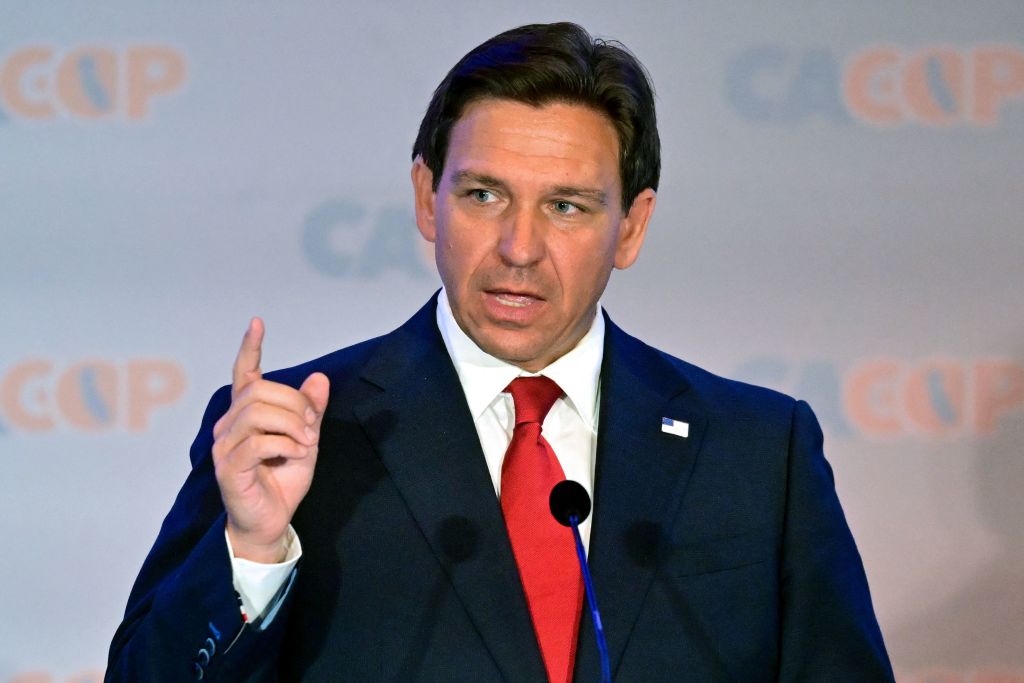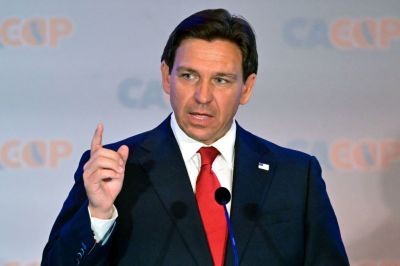Ron DeSantis raised roughly $10 million to $15 million in the third quarter, with Never Back Down, the super PAC supporting the Florida governor, collecting an additional $10 million to $20 million, Republican donors backing his presidential bid tell The Dispatch.
Reports for the three-month fundraising period that ended Saturday are not due to be filed with the Federal Election Commission until October 15. But wealthy Republican donors intimately involved in the DeSantis fundraising operation and familiar with approximate third-quarter tallies for the campaign and super PAC say the money raised obliterates a persistent narrative that the governor’s GOP financiers are jumping ship and that his 2024 effort is poised to run out of cash.
“I’m very pleased with our progress,” says Jay Zeidman, a businessman raising money for the DeSantis campaign and Never Back Down. “We have real momentum with our fundraising, especially in my home state of Texas. But there’s always more to be raised to ensure the campaign has the resources it needs to win these early states.” Zeidman notes that DeSantis raised more than $1 million during a September fundraising swing through the Lone Star State, including $300,000 in Houston.
That said, Donald Trump is still dominating the Republican primary, and DeSantis is laboring to become the consensus alternative to the former president and transform the crowded contest into a two-person affair. The governor entered the race in late May polling a strong second place both nationally and in surveys of the key early states, but his support has plummeted since. DeSantis is now running a distant second nationally and in Iowa; and he is polling third in New Hampshire and South Carolina, behind Nikki Haley, the former South Carolina governor.
Doubts about DeSantis’ viability have been compounded by early mismanagement of his campaign. The governor raised an impressive $20 million in the second quarter after just six weeks as a presidential candidate, but a high cash burn rate left his campaign running on fumes, triggering mass layoffs and leadership changes—and forcing the governor to cede control of most public events to financially flush Never Back Down. DeSantis donors emphasize the governor’s third-quarter FEC report will show the campaign is on solid financial footing.
The narrative surrounding DeSantis’ campaign has been mostly negative—particularly regarding fundraising—but donors raising money for the governor insist these stories do not reflect reality.
“When the campaign launched there were clearly some glitches,” says Hal Lambert, a Republican mega donor who runs an investment firm in Texas. “Once this quarter is announced, there’s not going to be a discussion around: Can he raise the money? Did he raise money? That narrative hasn’t gone away because there hasn’t been any news to discredit it.”
With less than 100 days until the January 15 Iowa caucuses, the challenge for DeSantis is persuading wealthy Republican contributors who are neutral to get off the fence and back him in the primary.
This community of GOP donors largely opposes Trump and is looking for a candidate capable of consolidating the support of voters looking elsewhere for a nominee. They don’t want a repeat of 2016, when Republican donors inadvertently greased Trump’s path to the nomination by spreading their money around to several candidates and creating a divided field. Meanwhile, as the former president’s poll numbers have climbed, GOP financiers have begun to question whether it's worth investing in the 2024 primary at all.
DeSantis donors, hoping to build on his performance in the first two Republican debates, are trying to woo uncommitted Republican contributors capable of writing six- and seven-figure checks to super PACs and bundling the same amount from their professional and personal contacts. Their pitch is two-pronged: Only DeSantis has the appeal with voters, and has built the campaign “infrastructure,” to outpace Trump in the primary and defeat President Joe Biden in the general election; and time is growing short.
That line about infrastructure was a swipe at Haley. The former U.S. ambassador to the United Nations, who has also turned in two solid debates, is gaining in the polls and catching the attention of Republican donors looking for a viable non-Trump contender. Haley has run a lean campaign and DeSantis, with the support of more than $100 million from Never Back Down, has the edge in terms of fielding an extensive voter turnout operation—at least in Iowa.
DeSantis donors are using that data point against Haley in the arms race for new GOP contributors.
“As relates to donors who have their finger in the wind, these people just aren’t serious,” says Pete Snyder, a businessman and DeSantis donor in Northern Virginia. “This is a race about whether Donald Trump is going to be our standard bearer or not, when we have a chance to win the White House. That’s it; it’s a binary choice.”






Please note that we at The Dispatch hold ourselves, our work, and our commenters to a higher standard than other places on the internet. We welcome comments that foster genuine debate or discussion—including comments critical of us or our work—but responses that include ad hominem attacks on fellow Dispatch members or are intended to stoke fear and anger may be moderated.
With your membership, you only have the ability to comment on The Morning Dispatch articles. Consider upgrading to join the conversation everywhere.